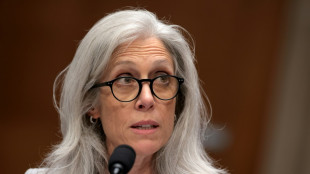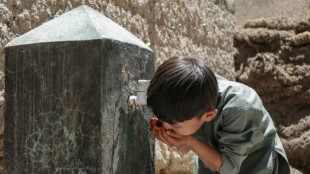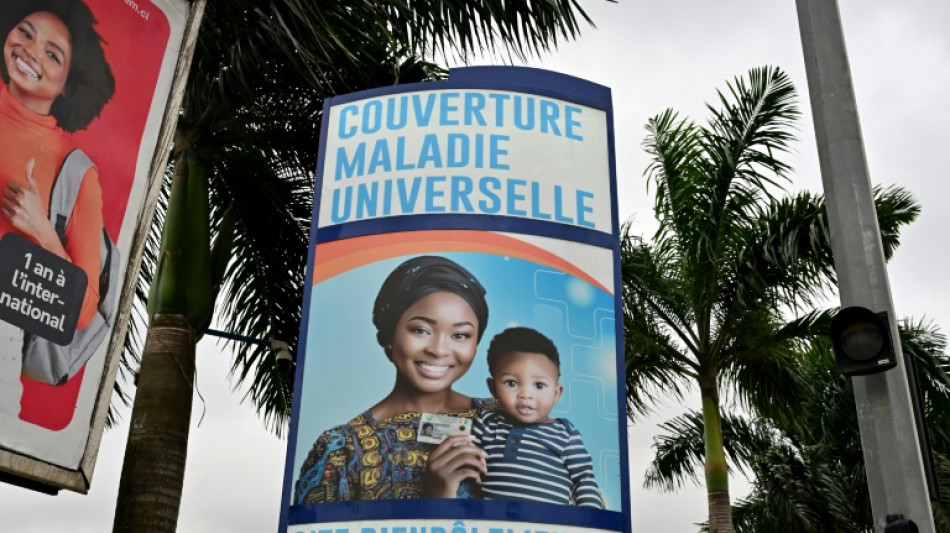
-
 Austria orders YouTube to give users access to their data
Austria orders YouTube to give users access to their data
-
Labubu fans flock to stores after launch of mini dolls

-
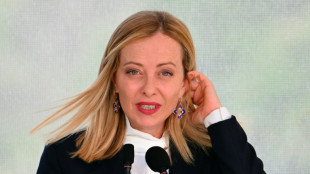 Italy's Meloni slams photo sharing in lewd sites scandal
Italy's Meloni slams photo sharing in lewd sites scandal
-
Swiss economic outlook 'dampened' by US tariffs: key barometer

-
 Tukuafu returns for women's rugby world champions New Zealand against Japan
Tukuafu returns for women's rugby world champions New Zealand against Japan
-
Israel army says Gaza City now 'a dangerous combat zone'

-
 Trump son hypes bitcoin on Hong Kong leg of Asia trip
Trump son hypes bitcoin on Hong Kong leg of Asia trip
-
Paetongtarn Shinawatra: glamorous Thai PM felled by Cambodia row

-
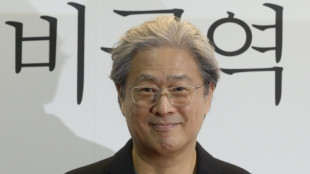 Park Chan-wook, master of black comedy, returns to Venice
Park Chan-wook, master of black comedy, returns to Venice
-
Mourinho sacked by Fenerbahce after Champions League exit

-
 German unemployment tops 3 million, highest for a decade
German unemployment tops 3 million, highest for a decade
-
Thai court sacks PM over Cambodia phone call row

-
 Turkey says Russia scales back Ukraine territorial demands
Turkey says Russia scales back Ukraine territorial demands
-
South Korea's ex-first lady indicted for bribery

-
 Lay off our eggs market, French producers tell Ukraine
Lay off our eggs market, French producers tell Ukraine
-
Modi says India, Japan to 'shape the Asian century'
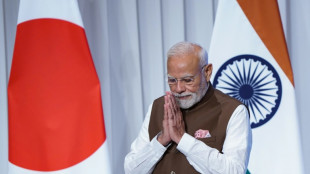
-
 Hope and hate: how migrant influx has changed Germany
Hope and hate: how migrant influx has changed Germany
-
Outdoor athletics season should be longer, says Coe

-
 Russian composer Rodion Shchedrin dies aged 92: Bolshoi
Russian composer Rodion Shchedrin dies aged 92: Bolshoi
-
Thai court to rule on PM's fate after Cambodia phone call row

-
 Last French survivor of key WWII desert battle dies aged 103
Last French survivor of key WWII desert battle dies aged 103
-
NZ police say CCTV shows father on the run for four years

-
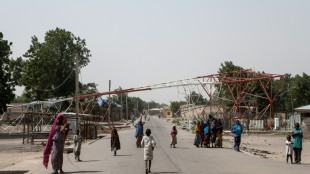 Vandalism hobbles Nigeria's mobile telephone services
Vandalism hobbles Nigeria's mobile telephone services
-
Indonesia leader orders investigation into driver's protest death

-
 At 81, DJ Gloria fills Sweden's dancefloors
At 81, DJ Gloria fills Sweden's dancefloors
-
Japan seeks record defence budget, to triple drone spending

-
 Late-night Paul battles through at US Open in 1:46 am finish
Late-night Paul battles through at US Open in 1:46 am finish
-
Jury finds Australian croc wrangler lied about air crash

-
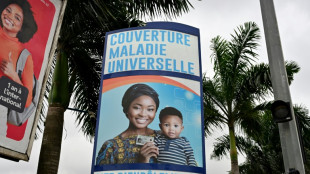 Mistrust undermines Ivory Coast's universal healthcare dream
Mistrust undermines Ivory Coast's universal healthcare dream
-
Australian police urge gunman to surrender after officers killed

-
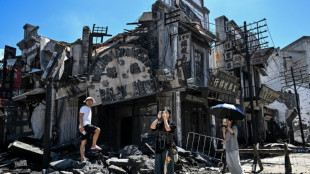 Nanjing massacre film set becomes China school holiday hotspot
Nanjing massacre film set becomes China school holiday hotspot
-
Celtic and Rangers seek Old Firm tonic for Champions League trauma

-
 Aussie Rules player latest found with concussion-linked brain disease
Aussie Rules player latest found with concussion-linked brain disease
-
Zelensky urges more Western pressure on Putin after deadly Russian attack

-
 US ends tariff exemption for small packages shipped globally
US ends tariff exemption for small packages shipped globally
-
Asia stocks mixed after Wall St hits new highs
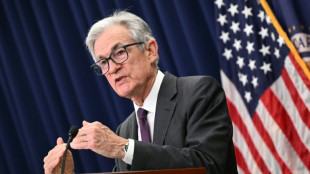
-
 Cash-strapped Taliban look to airspace for windfall
Cash-strapped Taliban look to airspace for windfall
-
Biles' presence helps Gauff win US Open crying game
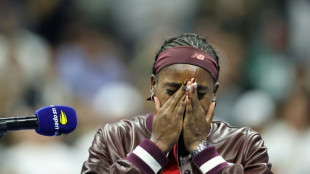
-
 'Female power': Japan erotic art destigmatised in new exhibit
'Female power': Japan erotic art destigmatised in new exhibit
-
Olympic marathon champion Hassan opts for Sydney ahead of worlds
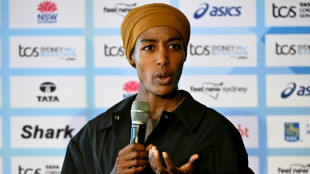
-
 Atletico already playing catch-up after poor La Liga start
Atletico already playing catch-up after poor La Liga start
-
Lyon find cause for optimism after turbulent summer

-
 Sinner on the march as tearful Gauff, Swiatek toil at US Open
Sinner on the march as tearful Gauff, Swiatek toil at US Open
-
Julia Roberts to make Venice debut in cancel culture drama

-
 Big numbers set to remain a feature of Women's Rugby World Cup
Big numbers set to remain a feature of Women's Rugby World Cup
-
Families lose hope for Salvadorans held in gang crackdown
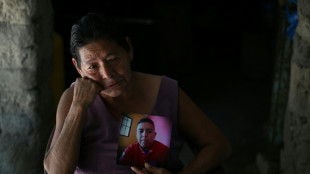
-
 Trump thumbs nose at decades of India courtship
Trump thumbs nose at decades of India courtship
-
Gauff wins crying game to reach US Open third round
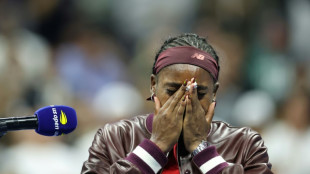
-
 Arsenal seek statement win at Liverpool, Amorim faces Burnley must-win
Arsenal seek statement win at Liverpool, Amorim faces Burnley must-win
-
Cowboys trade Parsons to Packers in blockbuster NFL deal


Mistrust undermines Ivory Coast's universal healthcare dream
As patients enter a major Abidjan hospital, a large sign informs them that Ivory Coast's universal health insurance will cover some of their medical expenses.
But although the healthcare coverage has been available for six years, many Ivorians still have not signed up for it -- and those that have often don't bother trying to use it.
Disillusionment and a lack of confidence in accessing the promised benefits have hampered government efforts to roll the system out.
Universal health coverage, known by its French acronym CMU, was first touted in Ivory Coast by President Alassane Ouattara, who in October will seek a fourth term in office.
The insurance scheme covers 70 percent of the costs of medical consultations and some medications for a monthly charge of 1,000 CFA francs ($1.80). The poorest receive full coverage.
But mistrust, fuelled by tales of health cards not working and a lack of information, have done nothing to encourage enrolment.
Medicines are often unavailable in pharmacies, with people complaining that replacement drugs are not covered by the CMU.
"Every time I tried, it didn't cover my medicines," Felix, who is in his 50s, said, adding he had to fork out 12,000 CFA francs a month on private health insurance.
Others share the opinion of the civil servant, who did not want his full name published, that universal health coverage "is useless".
In mid-July, authorities patted themselves on the back when enrolment hit 20 million, or two-thirds of the population.
Two years ago, the government even made enrolment compulsory for getting a passport, school and university registration and applying for a driver's licence.
It led to a surge in membership, which in 2022 was still under four million -- a "dazzling evolution", said Ahmed Diomande, deputy director general of the National Health Insurance Fund (CNAM).
However, less than four percent of those signed up to the CMU have used their insurance card this year, official figures show.
- 'A waste' -
Marie Djedje said she joined the CMU but later gave up out of disappointment.
"A card that doesn't work and I'm going to pay 1,000 francs. It's a waste!" she grumbled, leaving the hospital in Abidjan's Cocody neighbourhood.
Leaning on his crutch, Curtis Djibran, in his 40s, grimaced as he hobbled out after surgery on his foot following a road accident.
He told AFP he had signed up for universal health coverage but had not paid his monthly premium, forcing him to dip into savings to pay his health costs.
Under a recent push to drive up membership, mobile enrolment centres criss-crossed the country, with thousands of health agents, media, local deputies and traditional chiefs also spreading the word.
The health stakes are high.
Life expectancy at birth in the west African country is 60 years for men and 64 for women, according to the United Nations Population Fund.
While higher than at the turn of the century, Ivory Coast, the world's top cocoa grower and a regional economic powerhouse, trails Senegal and Cameroon.
"Many people enrol but don't use their card," Wilfried Abo, a gastroenterologist at the Cocody hospital, said.
"Most patients complain that many treatments and medications are not covered," he said, highlighting a lack of information.
Several hundred reference medicines -- original versions already on the market -- are covered by the scheme under "an evolving basket of care", the CNAM's Diomande said.
Studies on widening coverage to more illnesses such as some cancers are under way, he added.
- Poverty and perception -
Social anthropologist Firmin Kra said CMU services were "not adapted to the needs".
"A broad effort must be carried out with the various stakeholders to collect health data and map health needs," he said.
Universal health coverage "was not requested by the population, it was politicians who created the offer", the researcher added.
That explains why "the citizen perceives it as a tool used by the government to enrich itself", he said.
For big families, a monthly payment of 1,000 CFA francs is also a burden.
But the biggest challenge relates to farmers and workers in the informal economy, who desperately need low-cost health insurance.
More than 88 percent of Ivory Coast's jobs have no or little formal structure, according to the African Development Bank.
Most informal sector and farm workers cannot afford to keep up their monthly health coverage premiums.
According to CNAM, less than 10 percent of those in the informal sector -- which includes jobs such as street hawkers, market vendors or small-scale construction workers -- have managed to pay the monthly fee at least once.
The government has stepped up efforts to help by making the CMU free for four months this year.
It also struck an accord with the Coffee and Cocoa Council to assume the payments for 700,000 producers.
But the goal of ensuring all obtain the health services they need without financial hardship is still not a reality for many Ivorians.
M.Betschart--VB

